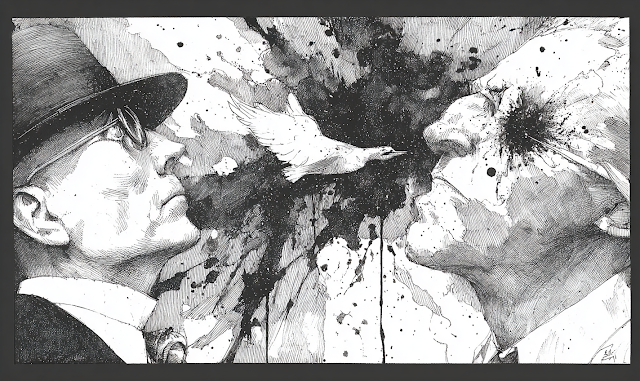Bloomsday, 22nd of Summer, 525 M.E. (Helios): Flayed glasseyed sheep hung from their haunches, sheepsnouts bloodypapered snivelling nosejam on sawdust. As you might have guessed based on certain words and phrases dropped in italics in recent posts, I've been reading Ulysses (James Joyce, 1922) since the beginning of June. About 10 pages a day (it's pretty dense stuff; any more would be overwhelming), along with an online reading group. Not that the group is offering much insight on the text, but they are providing needed moral support to keep soldiering on, as well as suggesting just where to start and stop in the reading each day.
I find it very helpful to follow along with the RTE Players' 1982 theatrical reading of Ulysses. Joyce doesn't use quotation marks in his text, and the podcast helps to distinguish between the characters' spoken words, their inner stream-of-consciousness monologue (which famously occupies much of the novel), and the author's narration.
After each day's reading, I then have to turn to Patrick Hastings' online Ulysses Guide to tell me what I just read, as I'm not clever enough to figure it all out myself. While Hastings give a broad overview of what's happening in the book, I also turn each day to John Hunt's annotations in The Joyce Project, which provides excellent line-by-line notes on dramatic, historical, and linguistic implications of the text.
For example, in today's reading, Leopold Bloom is absorbed in memories of an early romantic liaison and thinks, "Flowers her eyes were, take me, willing eyes. Pebbles fell. She lay still." I needed Hastings' help to realize the liaison was on Howth Head, "a lovely hilly peninsula overlooking Dublin Bay. . . north of the city." Of course, I recognize the penisolate location from the "Howth Castles and Environs" mentioned in the opening paragraph of Finnigan's Wake (from swerve of shore to bend of bay, etc.). I've been stuck on the first page of Finnigan for 50 years now, but that's another story for another post.
I recognize Howth Head, but without Hunt's annotations, I would not have realized that "pebbles fell" was an allusion to King Lear, when a blinded and despairing Gloucester wants to commit suicide by jumping from the cliffs of Dover. His son tricks the old man into believing that he is standing at the top of a cliff, far above the beach, telling him, "The fishermen that walk upon the beach, appear like mice. . . The murmuring surge, that on th' unnumb'red idle pebble chafes, cannot be heard so high." Hunt goes on to identify other instances when Joyce alludes to pebbles as a portent of danger and death that recur throughout the novel. Indeed, Molly is laying still, corpselike, and Bloom's reverie is both triggered by and interrupted by the buzzing of flies, those avatars of death and decay.
But despite all these resources, I'm still convinced I'm missing at least 50% of what's happening on the pages. But that's okay, all my online resources inform me. The novel's intended for multiple, repeat readings, and by design no one gets everything the first time through.
I'm not sure this old man will ever read this novel again - this may well be my one-off. I once breezed through the book back in my early 20s, flipping through the pages and just skimming the text - probably searching for the "dirty bits" that famously got the novel banned upon it's publication. But that hardly counts as a "reading," although I frequently claimed otherwise over the years ("Ulysses? Yes, I've read it once, back in the '70s"). My copy of the novel, both back then and now, is a 1942 Random House edition once owned by my grandfather and somehow passed on down to me. In fact, it's probably my having owned the book for so many years, schlepping it from one home to the next, one apartment to the other, over all those years that encouraged me to finally take the plunge and read it through
Anyway, I'm old now and this reading of one of those books one is supposed to have read before you die seems like a worthwhile post-retirement project to fill my late and languid days. For all its intricacies and eccentricities, I'm quite enjoying it.


No comments:
Post a Comment